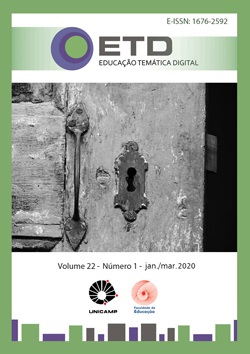Abstract
Because of its interface, the practice of exergames includes motor skills that involve a wide range of sensory feedback, adjustable range of motion, speed and accuracy levels, as well as a variety of cognitive and motor tasks. Thus, the association of the use of exergames with cognitive issues has been verified. This is an experimental study with intervention with a prospective longitudinal follow-up period of two months, controlled and double-blind. 64 school children between 8 and 10 years old were randomly assigned to an experimental (n = 25) and control group (n = 23). The experimental group, always monitored by two researchers, experienced a protocol consisting of exergames in 18 sessions of 20 and 30 minutes, replacing some curricular physical education classes. In the pre and post-tests a socio-demographic questionnaire was used, the Test of Concentrated Attention d2, Trail Making Test and the institutional school performance. Intervention, in general, did not influence the cognitive variables evaluated in the two homogeneous groups; however, age-sex interactions were found for the variable executive function related to cognitive flexibility, indicating a positive effect of the intervention for boys with age of 10 years.
References
BATES, Marsha E.; LEMAY, Edward. The d2 Test of Attention: construct validity and extensions in scoring techniques. Journal of the International Neuropsychological Society, v. 10, p. 392–400, 2004.
BEST, John. Effects of physical activity on children’s executive function: contributions of experimental research on aerobic exercise. Developmental Review, n. 30, p. 331–351, 2010.
BEST, John. Exergaming immediately enhances children’s executive function developmental psychology. American Psychological Association, v. 48, p. 1501-1510, 2012.
BIDDISS, Elaine; IRWIN, Jennifer. Active video games to promote physical activity in children and youth. Archives of Pediatrics & Adolescent Medicine, v. 164, p. 664-672, 2010.
BIERMAN, Karen, L.; NIX, Robert; GREENBERG, Mark; BLAIR, Clancy; DOMITROVICH, Celene, E. Executive functions and school readiness intervention: impact, moderation, and mediation in the Head Start REDI program. Development and Psychopathology, v. 20, p. 821-843, 2008.
BLAIR, Clancy.; RAZZA, Rachel, P. Relating effortful control executive function, and false belief understanding to emerging math and literacy ability in kindergarten. Child dev., v. 78, n. 2, p. 647-63, 2007.
BRICKENKAMP, Rolf. Teste d2 de atenção concentrada: manual, instruções, avaliação e interpretação. São Paulo: CETEPP, 2000.
CENTER ON THE DEVELOPING CHILD AT HARVARD UNIVERSITY. Construindo o sistema de “Controle de Tráfego Aéreo” do cérebro: como as primeiras experiências moldam o desenvolvimento das funções executivas. Cambridge: Center on the Developing Child at Harvard University, 2011.
DEUTSCH, Judith E; BRETTLER, Arielle; SMITH, Caroline; WELSH, Jamie; JOHN, R,oshan; GUARRERA-BOWLBY Phyllis; Kafri, Michael. Nintendo wii sports and wi fit game analysis validation and aplication to stroke rehabilitation. Topics in stroke reabilitation, v. 18, n. 6, p. 701-709, 2011.
DI TORE, Pio Alfredo.; RAIOLA, Gaetano. Exergames in motor skill learning. Journal of physical education and sport, v. 12, n. 3, p. 358-361, 2012.
DIAMOND, Adele. Effects of physical exercise on executive functions: going beyond simply moving to moving with thought. Ann Sports Med Res, v. 2, n. 1, p. 959-964, 2011.
DIAMOND, Adele; LEE, Kathleen. Interventions shown to aid executive function development in children 4 to 12 years old. Science, v. 6045, n. 959, p. 959-964, 2011.
DIAS, Natália.; SEABRA, Alessandra. The promotion of executive functioning in a brazilian public school: a pilot study. Spanish Journal of Psychology, v. 18, n. 8, p. 1-14, 2015.
FINN, Amy S; KRAFT, Matthew A; WEST Martin R; LEONARD, Julia A.; BISH, Crystal E; MARTIN Rebecca E.; SHERIDAN, Margaret A; GABRIELI, Christopher F. O; GABRIELI ,John D. E. Cognitive skills, student achievement tests, and schools. Psychol Sci, v. 25, n. 3, p. 736-744, 2014.
GREENBERG, Bradley; SHERRY, John; KENNETH Lachlan; LUCAS, Kristen; HOLMSTROM, Amanda. Orientations to video games among gender and age groups. Simulation & Gaming, v. 41, n. 2, p. 238-259, 2010.
MONTIEL José Maria; CAPOVILLA, Alessandra Gotuzo Seabra. Teoria e pesquisa em avaliação neuropsicológica. São Paulo: Memnon, 2007. 94-95 p.
MORTON, John Bruce. Funções executivas. Enciclopédia sobre o desenvolvimento na primeira infância. Canadá: University of Western Ontario, 2013.
MUNAKATA, Y; MICHAELSON, Laura; BARKER, Jane; CHEVALIER, Nicolas. As funções executivas na infância. In: ENCICLOPEDIA da primeira infancia. Bouder, Colorado: University of Colorado at Boulder, 2013.
RIGGS,Nathaniel R; JAHROMI, Laudan B; RAZZA, Rachel A , DILLWORTH-BART, Janean E., MUELLER, Ulrich. Executive function and the promotion of social-emotional competence. Journal of Applied Developmental Psychology, v. 27, p. 300-309, 2006.
BEST, John; MILLER, Patrícia, H.; NAGLIERI, Jack. Relations between executive function and academic achievement from ages 5 to 17 in a large, representative national sample. Learning Individual Differences, v. 21, p. 327-336, 2011.
RIVERO, Tiago. S.; QUERINO, Emanuel. H.; STARLING-ALVES, Isabela. Videogame: seu impacto na atenção, percepção e funções executivas. Neuropsicologia Latinoamericana, v.4, n. 3, p. 38-52, 2012.
SALEM, Yasser; ELOKDA, Ahmed S. Effectiveness of a low-cost virtual reality system for children with developmental delay: a preliminary randomised single-blind controlled trial. Physiotherapy, v. 98, n. 3, p. 189-195, 2012.
SINCLAIR, Jeff.; HINGSTON, Phillip.; MASEK, Martin. Considerations for the design of exergames. Proceedings of the 5th international conference on computer graphics and interactive techniques in Australia and southeast Asia. [S.L.]: [s.n.], 2007. p. 289-295.
SINGER, Robert. Performance and human factors: considerations about cognition and attention for self-paced and externally-paced events. Ergonomics, v. 43, n. 10, p. 1661-1680, 2000.
STAIANO, Amanda; CALVERT, Sandra, L. The promise of exergames as tools to measure physical health. Entertainment Computing, v. 2, p. 17-21, 2011.
TEASELL, Robert; MEYER Matthew J.; McCLURE, Andrew; PAN, Cheng; MURIE-FERNANDEZ, Manuel; FOLEY, Norine; SALTER, Katherine. Stroke rehabilitation: an international perspective. Top stroke rehabi, v. 16, 2009.
YEN Chang-Yi; LIN, Kwan-Hwa; HU,Ming-Hsia; WU, Ruey-Meei; LU, Tung-Wu; LIN, Chia-Hwa. Effects of virtual reality-augmented balance training on sensory organization and attentionaldemand for postural control in people with parkinson disease: a randomized controlled trial. Phys ther, v. 91, p. 862-74, 2011.
The ETD - Digital Thematic Education uses the Creative Commons license (CC), thus preserving the integrity of the articles in an open access environment.


